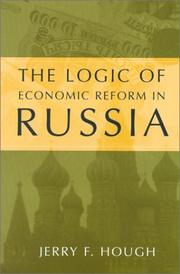| Listing 1 - 2 of 2 |
Sort by
|

ISBN: 0815737548 081573753X 0815798598 Year: 2001 Publisher: Washington, D.C. : Brookings Institution Press,
Abstract | Keywords | Export | Availability | Bookmark
 Loading...
Loading...Choose an application
- Reference Manager
- EndNote
- RefWorks (Direct export to RefWorks)
This book examines the failure of economic reform in Russia since 1991, when Boris Yeltsin proclaimed his commitment to economic stabilization, privatization, and price liberalization. Optimism over Russia#65533;#65533;s market reforms vanished with the crash of August 1998, when the ruble lost over 70 percent of its value and banks defaulted on their debts and forward currency contracts. Contrary to Yeltsin#65533;#65533;s reform promises, the Russian economy of the 1990s more closely resembled a Soviet model than a market-driven one. The Logic of Economic Reform in Russia illuminates the general problems of establishing market economies in settings where the institutional system to support the market has not had decades to develop. Suggesting that corruption may be associated with growth in the early stages of capitalism, Jerry F. Hough argues that the disappointing results of Yeltsin#65533;#65533;s reform efforts were not the product of Russian culture or history, but the logical consequences of rational men responding to the incentive system created by economic reform.
Economic policy and planning (general) --- Russian Federation --- Privatization --- Russia --- Russia (Federation) --- Politics and government --- Economic conditions --- Economic policy
Book
ISBN: 131605697X 1316054608 1316080617 1316075885 1107670411 1316071154 1107479835 1316078256 1316073513 9781316073513 1107063698 1322521565 9781107479838 9781316075883 9781316078259 9781107063693 9781107670419 Year: 2015 Publisher: Cambridge : Cambridge University Press,
Abstract | Keywords | Export | Availability | Bookmark
 Loading...
Loading...Choose an application
- Reference Manager
- EndNote
- RefWorks (Direct export to RefWorks)
Douglass North once emphasized that development takes centuries, but he did not have a theory of how and why change occurs. This groundbreaking book advances such a theory by examining in detail why England and Spain developed so slowly from 1000 to 1800. A colonial legacy must go back centuries before settlement, and this book points to key events in England and Spain in the 1260s to explain why Mexico lagged behind the United States economically in the twentieth century. Based on the integration of North's institutional approach with Mancur Olson's collective action theory, Max Weber's theory of value change, and North's focus on dominant coalitions based on rent and military in In the Shadow of Violence, this theory of change leads to exciting new historical interpretations, including the crucial role of the merchant-navy alliance in England and the key role of George Washington's control of the military in 1787.
State, The --- Political development. --- Economic development --- Development, Economic --- Economic growth --- Growth, Economic --- Economic policy --- Economics --- Statics and dynamics (Social sciences) --- Development economics --- Resource curse --- Development, Political --- Political science --- Philosophy. --- History --- Great Britain --- Spain --- Espagne --- Espainiako Erresuma --- España --- Espanha --- Espanja --- Espanya --- Estado Español --- Hispania --- Hiszpania --- Isupania --- Kingdom of Spain --- Regne d'Espanya --- Reiaume d'Espanha --- Reino de España --- Reino d'Espanya --- Reinu d'España --- Sefarad --- Sepharad --- Shpanie --- Shpanye --- Spanien --- Spanish State --- Supein --- イスパニア --- スペイン --- Politics and governmenty --- Politics and government --- Colonies --- Administration. --- Political development --- Philosophy --- E-books
| Listing 1 - 2 of 2 |
Sort by
|

 Search
Search Feedback
Feedback About
About Help
Help News
News